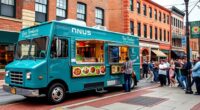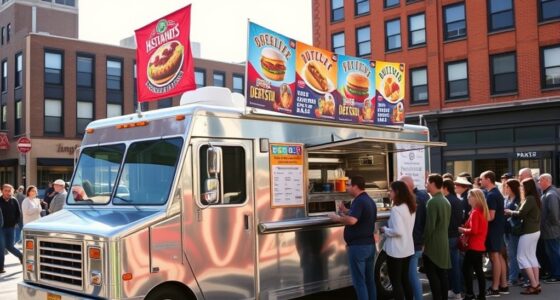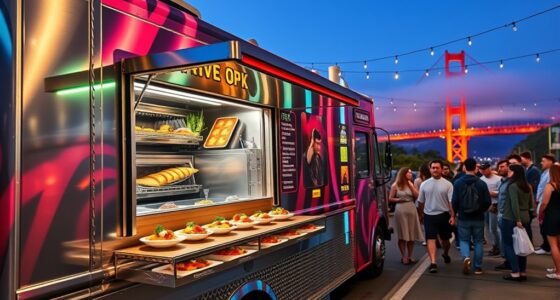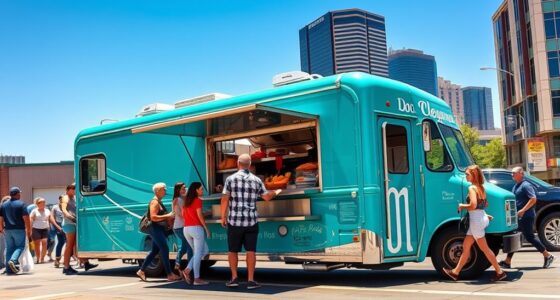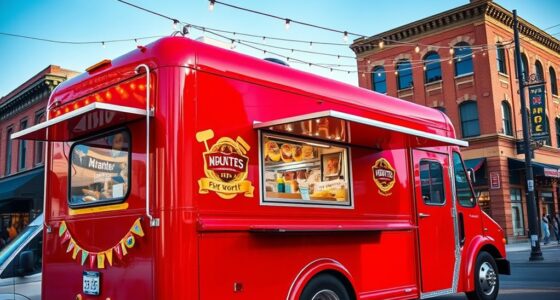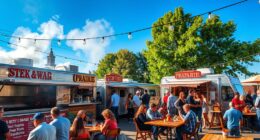To start a food truck in New Orleans, you need to understand the city’s vibrant culinary scene and local regulations. Obtain necessary permits, such as a business license, health approvals, and street vending permits, while ensuring your vehicle meets sanitation standards. Develop a menu inspired by local flavors, source ingredients locally, and set competitive prices. Use technology for smooth operations and actively engage with the community and local influencers. If you want to learn more about making your food truck thrive in NOLA, keep exploring.
Key Takeaways
- Obtain necessary permits, including business license, mobile food vendor permit, and health approvals, specific to New Orleans regulations.
- Develop an authentic menu inspired by local flavors using regional ingredients to attract both locals and tourists.
- Secure funding through microloans and purchase comprehensive insurance to cover liability and vehicle risks.
- Choose compliant shared kitchen spaces and design efficient layouts adhering to sanitation and safety standards.
- Participate in local markets, festivals, and collaborate with food bloggers to build visibility and establish community relationships.
Vibrant Culinary Scene in New Orleans
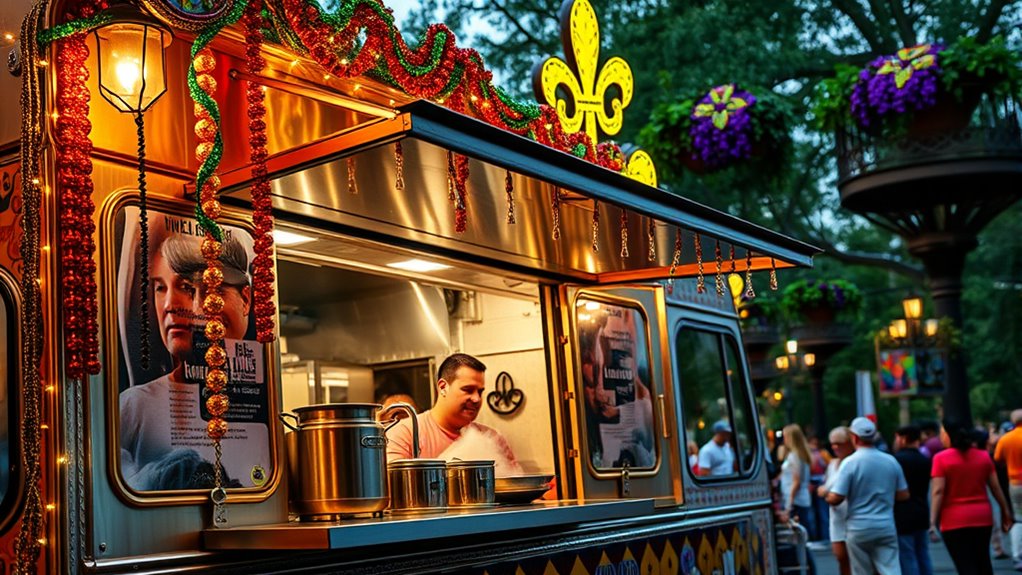
New Orleans boasts a vibrant culinary scene that draws food lovers from around the world. This city thrives on cultural fusion, blending flavors from French, African, Spanish, and Caribbean traditions to create a truly unique food landscape. As a food truck owner, you can tap into this diversity by offering dishes inspired by these rich influences. The city’s festival collaboration culture also offers fantastic opportunities to showcase your cuisine. During events like Mardi Gras or the Jazz & Heritage Festival, you can partner with local organizers to serve specialty dishes, gaining visibility and attracting a diverse crowd. Embracing this vibrant culinary environment allows you to stand out and connect with passionate food enthusiasts keen to explore New Orleans’ ever-evolving food scene. Additionally, understanding the cultural fusion that defines New Orleans cuisine can help you craft authentic and appealing menu options that resonate with locals and visitors alike.
Understanding Local Requirements
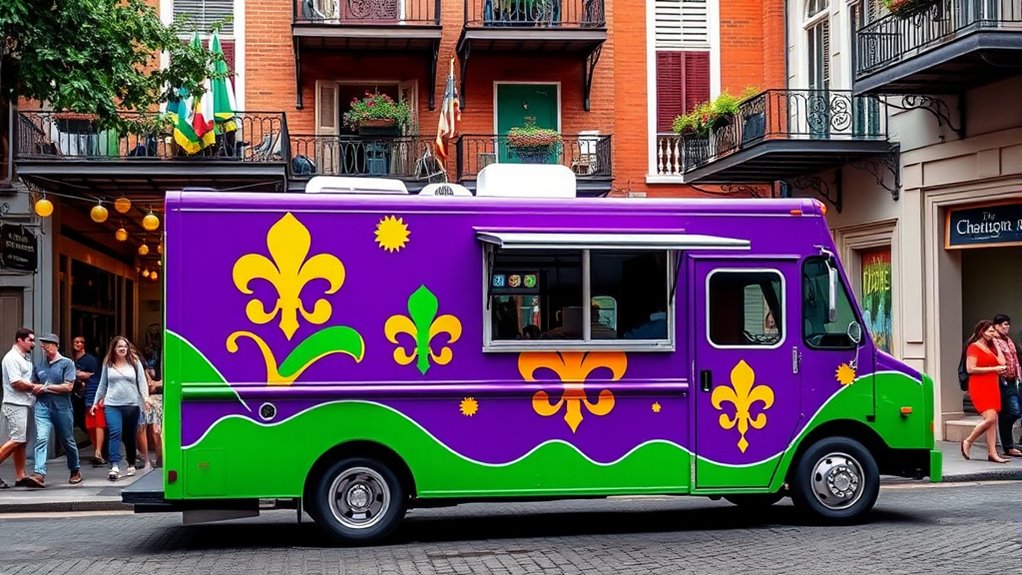
To operate a food truck in New Orleans, you need to understand the local permits required and guarantee your vehicle meets sanitation standards. You’ll also need to familiarize yourself with designated street vending zones to stay compliant. Getting these details right helps you avoid fines and keeps your business running smoothly. Additionally, understanding merchant services can help streamline your payment processes and improve customer satisfaction.
Permits for Food Trucks
Before you start serving your delicious dishes, you need to obtain the necessary permits to operate legally in New Orleans. This includes a business license, a mobile food vendor permit, and health department approvals. These permits are essential for complying with local regulations and ensuring smooth operations. When applying, focus on your food truck branding, making sure your vehicle displays your logo and branding elements clearly, which attracts customers. Proper permits also help boost customer engagement by building trust and credibility. Remember, each permit has specific requirements, so review the city’s regulations carefully. Failing to secure the right permits can lead to fines or shutdowns, so prioritize this step to launch your food truck business smoothly and legally.
Sanitation Protocols and Record-Keeping
Ensuring proper sanitation is essential for your food truck’s success and compliance with local health regulations. You must follow strict sanitation protocols to pass health inspections and keep your customers safe. Develop and stick to detailed cleaning schedules that cover all food contact surfaces, utensils, and equipment. Regular cleaning prevents bacteria buildup and contamination, reducing the risk of violations. Keep thorough records of your cleaning routines, including dates, times, and actions taken, as these are often required during health inspections. Maintaining accurate documentation demonstrates your commitment to cleanliness and helps resolve any issues quickly. Stay informed about New Orleans’ specific sanitation requirements and ensure your protocols align with local health department standards. Proper sanitation and diligent record-keeping safeguard your business and reputation.
Designated Street Vending Zones
Understanding the designated street vending zones in New Orleans is crucial for operating your food truck legally and smoothly. You must follow local street vending regulations and parking restrictions to avoid fines or shutdowns. The city designates specific zones where vending is permitted, often with time limits and licensing requirements. Familiarize yourself with these zones to ensure you’re in the right spot and compliant.
| Zone Type | Restrictions |
|---|---|
| Commercial Districts | Limited hours |
| Residential Areas | No vending |
| Tourist Zones | Higher fees |
| Event Areas | Permitted with permit |
| Parking Lots | Authorized only |
Staying within these zones helps you avoid violations and build a good reputation.
Setting Up Your Base of Operations
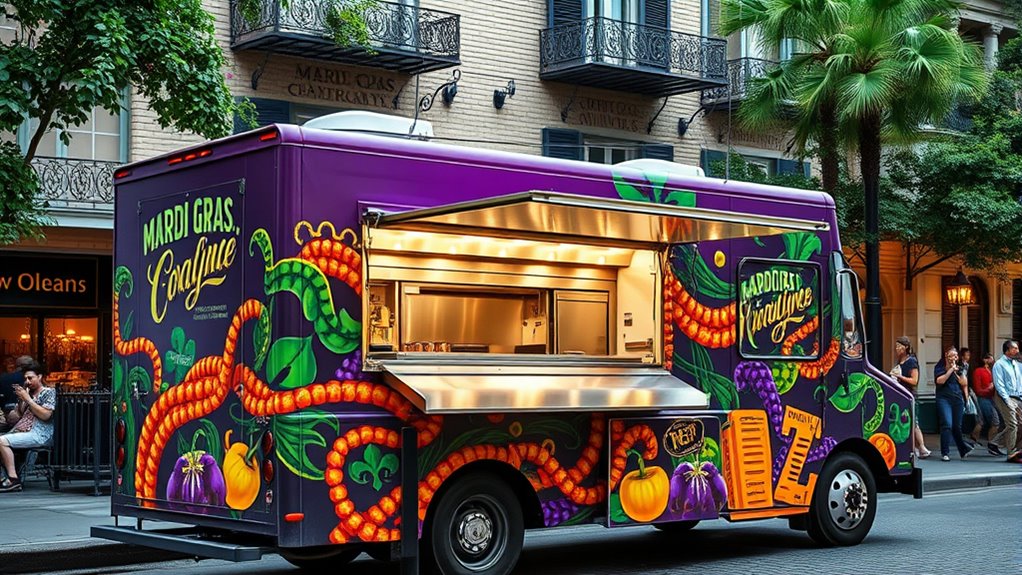
Choosing the right shared kitchen licensing options can secure you time and money as you start. Planning your custom kitchen layout ensures your space meets your specific cooking needs. By focusing on these key points, you’ll set a solid foundation for your food truck operation. Incorporating proper safety measures into your setup can help prevent issues and ensure compliance with health regulations.
Shared Kitchen Licensing Options
Setting up your food truck often involves selecting the right shared kitchen to serve as your base of operations. Shared kitchen licensing is essential to guarantee you meet local health and safety standards. Co-working kitchen regulations vary, so it’s important to choose a facility compliant with New Orleans’ requirements. These kitchens typically hold the necessary permits, making licensing smoother for you. Using a shared kitchen can reduce costs and simplify your start-up process, but you must verify that the space adheres to all licensing laws. Some kitchens offer flexible hours and shared equipment, which can be advantageous. Be sure to review the licensing details and co-working kitchen regulations carefully before committing, ensuring your food truck operates legally and efficiently from the very beginning.
Custom Kitchen Layout Planning
Once you’ve secured a shared kitchen that meets licensing requirements, designing a custom layout tailored to your food truck’s needs becomes the next step. Focus on layout optimization to maximize efficiency and workflow. Carefully select kitchen equipment that suits your menu and space constraints, ensuring everything is accessible and well-organized. Plan for adequate prep areas, cooking stations, and storage to streamline operations during busy hours. Consider traffic flow to minimize movement and prevent cross-contamination. Use space-saving solutions like vertical storage and multi-purpose equipment. A well-thought-out layout not only improves productivity but also helps meet health and safety standards. By customizing your kitchen layout, you create a functional, efficient base of operations that supports your success on the streets of New Orleans.
Budgeting and Financing Your Food Truck
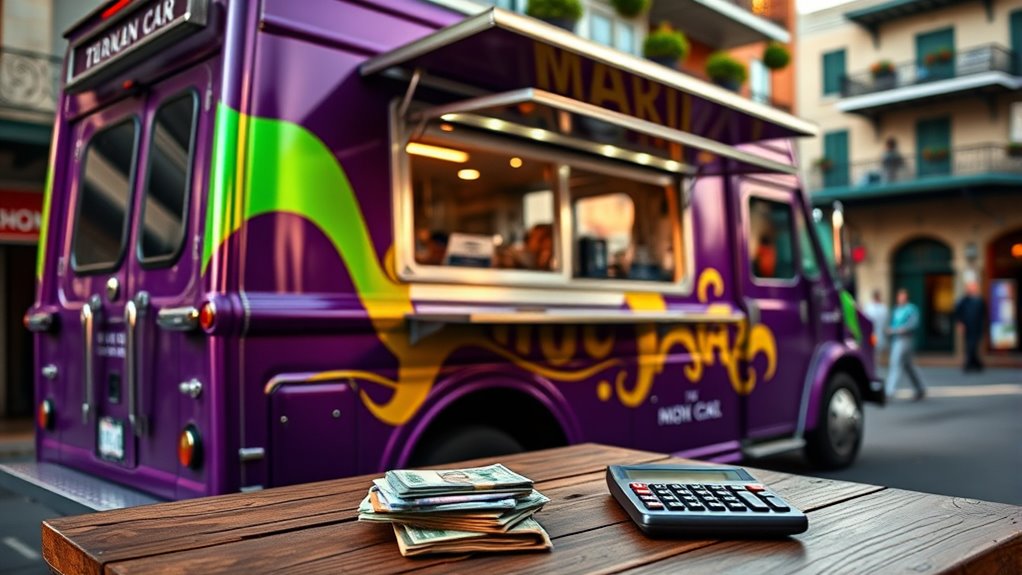
Getting your food truck off the ground starts with understanding your initial vehicle costs and exploring local microloan programs to obtain funding. You’ll also need to budget for liability coverage to protect your business. Being clear on these points helps ensure your finances are solid as you launch in New Orleans. Additionally, researching Glycolic Acid benefits can be beneficial if you plan to offer skincare-related products or services to your customers.
Initial Vehicle Purchase Costs
When budgeting for your food truck, the initial vehicle purchase cost is one of the biggest expenses you’ll face. Prices vary depending on whether you buy new or used, with used trucks generally costing less but possibly requiring more repairs. Keep in mind that vehicle maintenance costs will add up over time, so choosing a reliable model can save you money in the long run. Additionally, insurance costs are a vital part of your budget—commercial vehicle insurance protects your business and can vary based on the truck’s size and coverage levels. Carefully evaluate your options to balance upfront costs with ongoing expenses. Proper planning ensures you select a vehicle that fits your budget today and remains sustainable as your food truck business grows.
Local Microloan Programs
Securing financing is a key step in launching your food truck, and local microloan programs can be a valuable resource to help cover startup costs. Microloan advantages include smaller loan amounts, flexible terms, and easier qualification compared to traditional bank loans. These programs are designed to support small businesses like yours, especially in a vibrant city like New Orleans. The loan application process tends to be straightforward, often requiring basic financial documents and a solid business plan. Microloans can provide the necessary capital to purchase equipment, initial inventory, or cover other early expenses. By taking advantage of these local microloan programs, you can secure funding efficiently and move closer to turning your food truck dream into reality.
Liability Coverage for Food Trucks
Have you considered how liability coverage impacts your food truck’s budget and financing? Insurance requirements vary, but having proper liability coverage is essential to protect your investment. It covers damages or injuries caused by your truck, affecting your overall costs. Be aware of policy exclusions that could leave gaps in your coverage, potentially leading to unexpected expenses. To help visualize, consider this table:
| Coverage Type | What It Protects |
|---|---|
| General Liability | Injuries or property damage claims |
| Vehicle Insurance | Accidents involving your truck |
| Product Liability | Food-related claims |
Balancing coverage costs with your budget ensures you’re prepared without overspending. Proper liability coverage is a key component of your food truck’s financial plan.
Designing Your Menu and Pricing Strategy
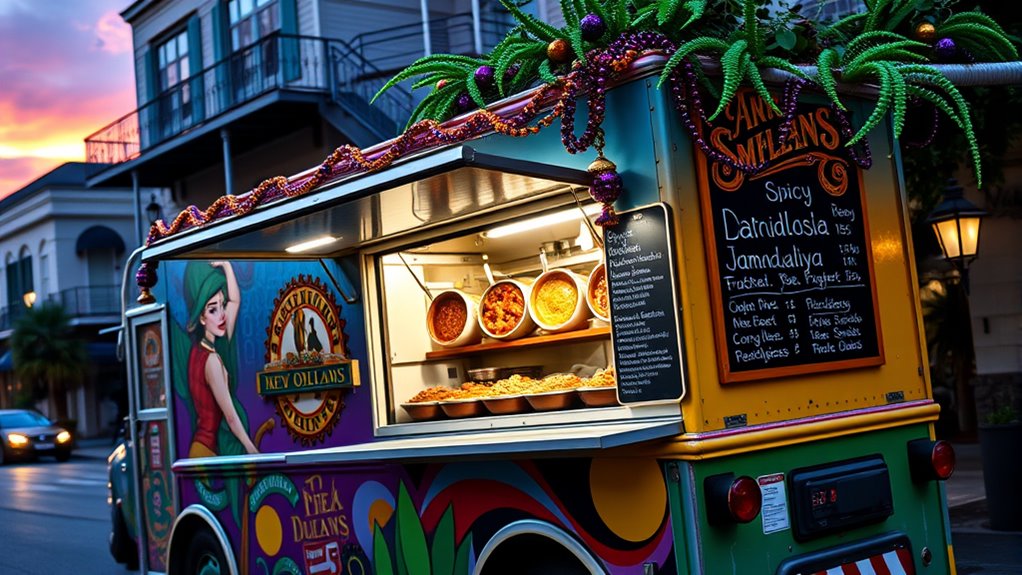
When designing your menu, focus on sourcing unique local ingredients that stand out to customers. Calculating the cost per plate helps you set prices that cover expenses while remaining competitive. By balancing quality and affordability, you’ll create a menu that appeals to both your budget and your audience. Incorporating different crochet styles for locs can also inspire creative presentation ideas for your food truck branding or merchandise.
Unique Local Ingredient Sourcing
Using local ingredients not only enhances the freshness and authenticity of your menu but also allows you to create a unique dining experience that resonates with the community. You can tap into local foraging to find ingredients like wild herbs, berries, or seafood that aren’t available elsewhere, giving your dishes a distinctive flavor. Emphasizing ingredient seasonality helps you plan your menu around what’s freshest and in peak condition, which can reduce costs and improve quality. Partnering with local farmers and vendors ensures a steady supply of seasonal produce and meats, supporting the local economy. This approach not only boosts your menu’s appeal but also demonstrates your commitment to sustainability and community involvement, making your food truck stand out in New Orleans’ vibrant food scene.
Cost per Plate Calculations
Understanding your food costs is key to creating a sustainable menu that appeals to customers and maintains profitability. To determine your cost per plate, start by calculating the ingredient cost for each item. Break down your ingredient costs based on the portion size you plan to serve; smaller portions may lower costs but could impact customer satisfaction. Be precise with portion sizes to ensure consistency and accurate cost calculations. Keep track of all ingredients used, including spices and garnishes, and divide the total cost by the number of servings. This will give you a clear idea of your base cost. From there, you can set a menu price that covers costs while remaining competitive in the New Orleans market. Proper cost per plate calculations help you balance quality, pricing, and profit margins effectively.
Technology and Operations
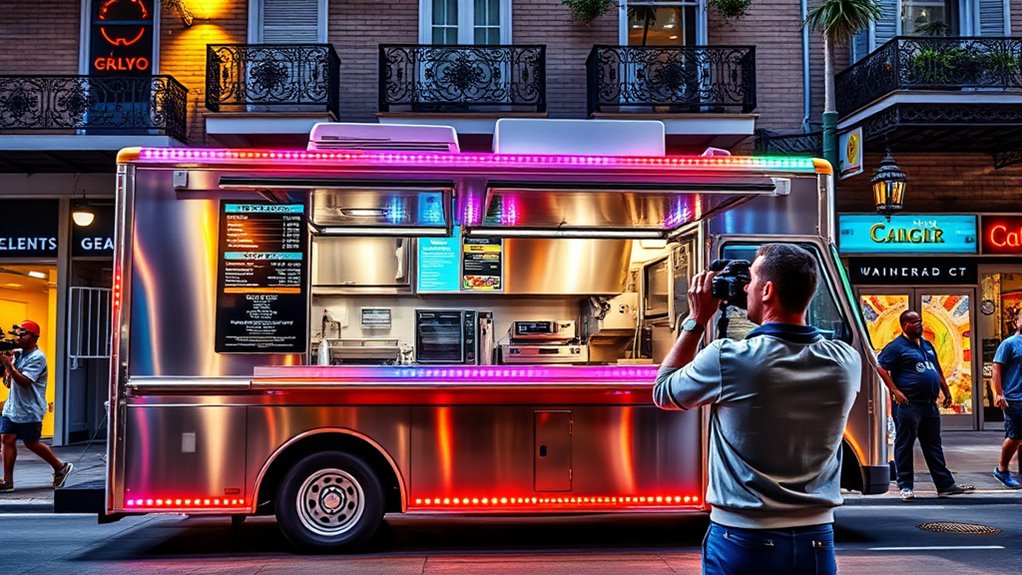
You can streamline your sales with wireless card readers that accept mobile payments quickly and securely. Using real-time stock tracking software helps you stay on top of inventory and prevent shortages during busy hours. Incorporating these technologies guarantees your operations run smoothly and keeps customers satisfied.
Wireless Card Readers for Mobile Payments
Wireless card readers have become essential tools for food trucks in New Orleans, enabling quick and secure mobile payments. These devices facilitate digital payment methods, making transactions seamless for both you and your customers. By integrating a mobile POS system, you can process credit and debit cards on the spot, reducing wait times and increasing sales. Wireless card readers are portable, durable, and easy to set up, allowing you to accept payments anywhere at your location or during events around the city. They also offer encrypted security features, protecting sensitive customer information. With these tools, you can provide a smooth, professional experience that encourages repeat business. Embracing wireless card readers helps your food truck stay competitive and meets the modern expectations of your customers.
Real-Time Stock Tracking Software
Real-time stock tracking software revolutionizes how food trucks manage inventory by providing instant updates on ingredient levels and product availability. This technology streamlines inventory management, helping you avoid shortages or overstocking. It also enhances supply chain logistics by alerting you when stock levels fall below thresholds, ensuring timely reordering. You can see which ingredients need restocking without manual checks, saving time and reducing errors. Implementing this software boosts efficiency, minimizes waste, and improves customer satisfaction. Here’s a quick comparison of traditional vs. real-time stock tracking:
| Aspect | Traditional Tracking | Real-Time Stock Tracking |
|---|---|---|
| Inventory Updates | Manual, delayed | Instant, automated |
| Supply Chain Management | Reactive, prone to errors | Proactive, accurate |
| Time Consumption | High | Low |
| Accuracy | Variable | Consistently high |
Leverage this tech to optimize your food truck’s operations.
Marketing and Growing Your Presence
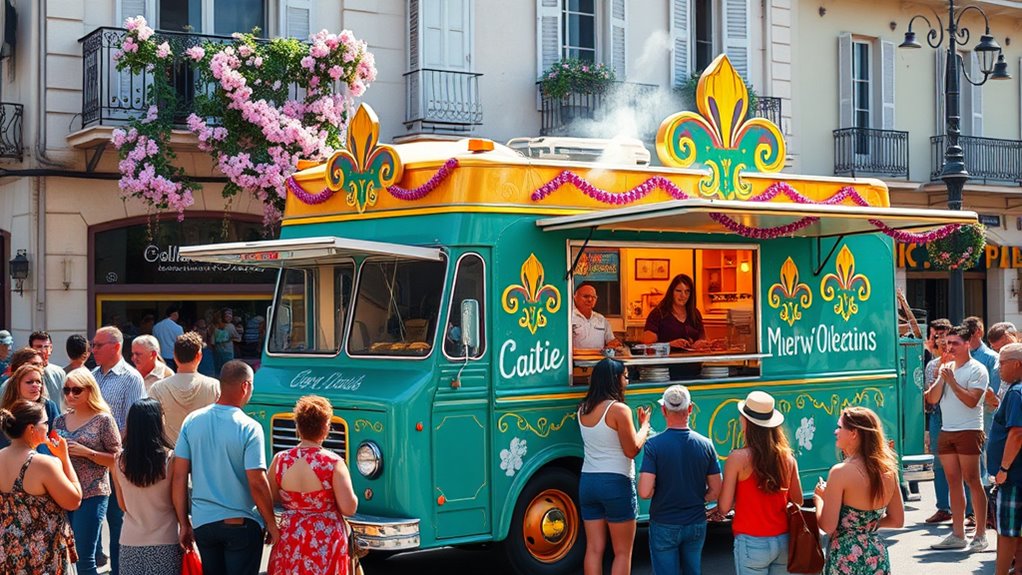
To grow your food truck’s presence in New Orleans, focus on hitting popular weekly market locations to attract more customers. Engaging local food bloggers can also boost your visibility and build buzz around your offerings. By combining these strategies, you’ll create a stronger connection with the community and increase your chances of long-term success.
Popular Weekly Market Locations
Growing your presence at popular weekly markets in New Orleans requires strategic placement and consistent participation. Focus on locations that host local food festivals and celebrate regional culinary traditions, as these attract large, food-loving crowds enthusiastic to discover new vendors. By regularly attending well-known markets like the French Market or the Crescent City Farmers Market, you build recognition and loyalty among locals and tourists alike. These markets offer prime visibility for your food truck and opportunities to showcase authentic flavors that resonate with the city’s rich culinary heritage. Establishing a steady presence at these venues helps you connect with your target audience, boost sales, and grow your reputation in the vibrant New Orleans food scene.
Engaging Local Food Bloggers
Engaging local food bloggers can substantially boost your presence in New Orleans’ vibrant food scene. Collaborate with bloggers to showcase your food truck branding and create buzz through social media marketing. When bloggers share their experiences, it builds authenticity and trust, attracting more customers. Reach out to them with personalized invites or exclusive tastings to spark genuine excitement. Use their platforms to tell your story and highlight what makes your food truck unique. Here’s an emotional snapshot of what this collaboration can evoke:
| Excitement | Community Connection | Trust | Visibility | Growth |
|---|---|---|---|---|
| Sizzle of new flavors | Feeling part of NOLA’s culinary family | Confidence in quality | Local recognition | Steady customer flow |
Navigating NOLA Food Truck Scene
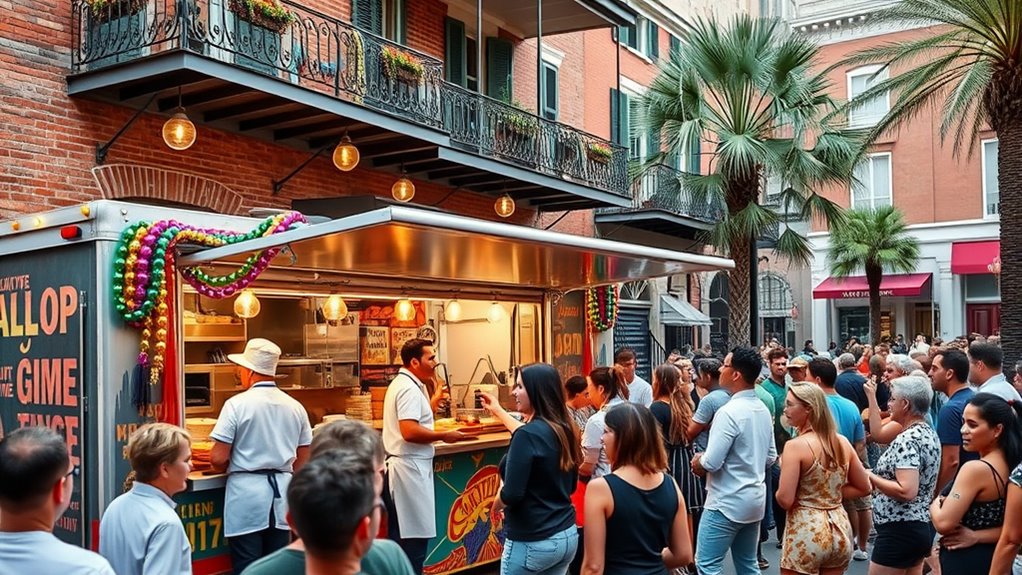
Exploring the NOLA food truck scene can feel overwhelming at first, but with a little guidance, you’ll find some of the city’s best eats just a few steps away. To stand out, focus on strong food truck branding—create a memorable logo and cohesive design that reflects your cuisine and personality. This helps attract attention and build recognition among locals and tourists alike. Engaging with customers is equally important; interact authentically, ask for feedback, and show your enthusiasm. A friendly, approachable attitude encourages repeat visits and positive word-of-mouth. Keep an eye on popular spots, festivals, and food truck gatherings to get a feel for the scene. By understanding these elements, you’ll navigate NOLA’s vibrant food truck culture with confidence and ease.
Frequently Asked Questions
What Permits Are Required for Food Trucks in New Orleans?
You need to obtain food truck permits and meet licensing requirements to operate legally in New Orleans. First, apply for a Mobile Food Vending Permit from the Louisiana Department of Health. You’ll also need a City of New Orleans Business License and a Louisiana Sales Tax Permit. Make sure your truck passes health inspections and complies with local zoning laws. Staying current with permits guarantees smooth operation and avoids fines.
Are There Specific Health Codes Unique to NOLA?
You need to follow New Orleans’ specific health codes, which local health inspectors enforce through regular inspections. These regulations focus on food safety, proper storage, and hygiene standards unique to the city’s requirements. You must comply with local food safety regulations to pass inspections and operate legally. Staying updated with any changes guarantees you meet health code standards, helping you avoid fines and keep your food truck compliant.
How Can I Find Prime Locations for My Food Truck?
You should explore high-traffic areas like French Quarter and CBD, using parking strategies such as designated spots or street permits to secure your spot. Partner with local events, festivals, and markets to gain prime exposure. Reach out to event organizers, community centers, and parks to establish partnerships. These strategies increase visibility, attract diverse crowds, and boost sales, making your food truck a go-to spot in New Orleans.
What Are the Common Challenges Faced by Food Truck Owners Here?
You’ll face challenges like seasonal fluctuations affecting your sales, especially during off-peak times. Equipment maintenance is crucial to keep your truck running smoothly and avoid costly breakdowns. Steering through local regulations and permits can also be tricky. Staying adaptable and planning ahead helps you manage these issues effectively. Focus on maintaining your equipment regularly and adjusting your menu or hours to match seasonal demand, ensuring your food truck stays successful year-round.
Are There Networking Groups for Food Truck Entrepreneurs in NOLA?
Imagine a bustling street where food truck enthusiasts gather like a vibrant festival—yes, there are food truck meetups and entrepreneurial networking events in NOLA that you can’t miss! These groups are your gateway to connections, advice, and collaborations that can transform your biz. Immerse yourself in local social media pages, join industry meetups, and you’ll find yourself in the heart of NOLA’s thriving food truck community, ready to grow your passion.
Conclusion
Starting a food truck in New Orleans is an exciting journey that lets you become part of this vibrant culinary scene. With the right planning, understanding local rules, and a passion for great food, you can create a unique experience that draws in locals and tourists alike. Are you ready to turn your culinary dreams into a bustling NOLA food truck? Imagine yourself serving up flavors that leave a lasting impression—your adventure awaits!

